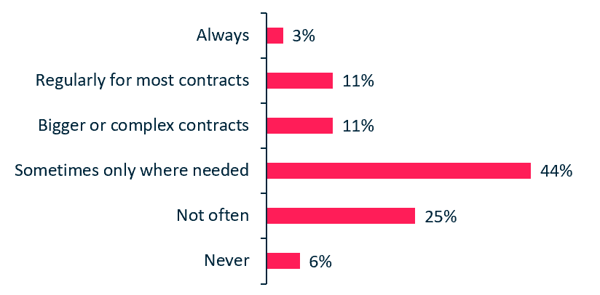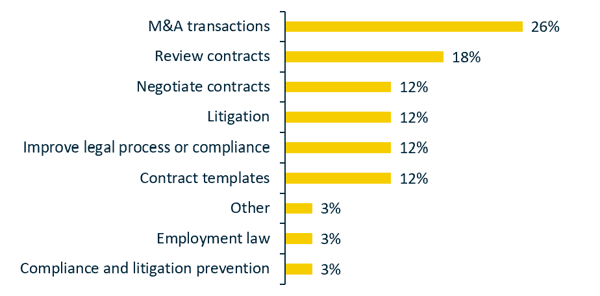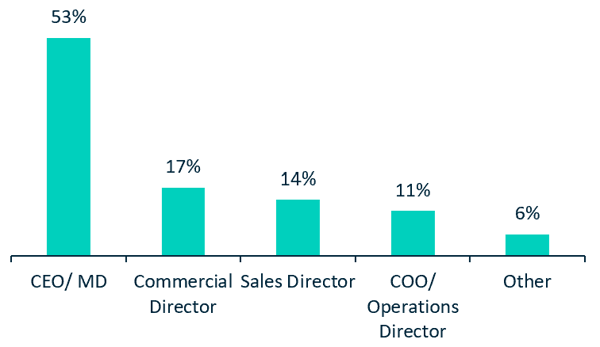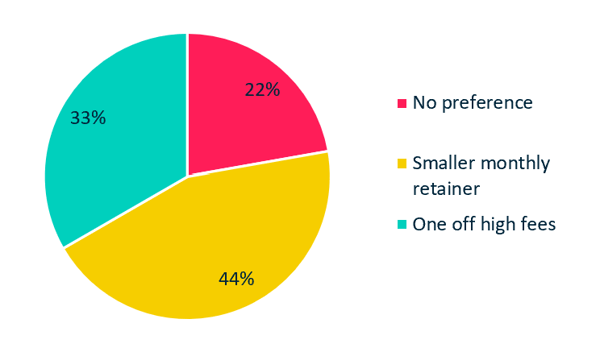
July 26, 2022
This is the ninth instalment in this year’s Microsoft Partner Insights, our annual research into Microsoft Partners.
Table of contents
How often do Microsoft Partners ask for legal advice?
When do Microsoft Partners call a lawyer?
It was Benjamin Franklin, one of the Founding Fathers of the United States, who famously said, “An ounce of prevention is worth a pound of cure”. This is especially true when it comes to addressing legal matters. Yet for many Microsoft Partners, retaining or even speaking with a lawyer is pretty far down on their ’to-do’ list.
The facts speak for themselves – a 2016 report produced by YouGov (YouGov | What the world thinks), in conjunction with LawBite and Centre for Economics and Business Research (Leading economic forecasts and analysis | Cebr), estimated that small and medium-sized enterprises (SME) lose more than £13.6 billion per year by failing to take care of their legal issues. With Microsoft Partners accounting for 1% of all UK VAT registered businesses, in excess of 30,000 Partners, their contribution to this number will be sizable.
As part of this year’s research for our Microsoft Partner Insights series we invited the leaders of over 50 of the UK’s most successful SME Microsoft Partners to take part in a survey covering, amongst other topics, legal services. The results paint an interesting picture.
How often do Microsoft Partners ask for legal advice?
We first wanted to get an understanding of how many Microsoft Partners in our cohort use a lawyer at all.

Almost half (44%) of the CEOs said that their companies sometimes used commercial lawyers. This was by far the most common response and had increased compared to the 2021 research where this accounted for 25%.
It was surprising to see that only 14% of the group either regularly, or always, used commercial lawyers, this was unchanged from the previous year.
More concerning though was the fact that almost a third of Microsoft Partners (31%) either never, or very rarely, used lawyers – a slight increase from 27% at the same point twelve months ago.
These results were even more concerning when considering the additional findings of the YouGov/LawBite report which surveyed in excess of 1,000 SME’s and found that:
- The average SME is likely to encounter more than 8 legal issues a year
- Of the legal issues SME’s experienced, 43% resulted in costs of £5,000 or more
- More than half of all issues were found to be in five key areas:
- Disputes 13.2%
- Employees and Key Contractors 12.5%
- Customers and Suppliers 11.4%
- Terms and Conditions 9.2%
- Software 9.1%
- Other 44.6%
When do Microsoft Partners call a lawyer?
So, under what circumstances would the participants in our survey consider hiring a lawyer?

- M&A transactions
The most popular reason, accounting for 26% of our cohort, was to assist with M&A transactions. This is significant jump from our 2021 research when ‘M&A transactions’ only accounted for 5% of responses. This is potentially indicative of the boom in tech sector M&A activity over the last year. In fact, it was a record year for M&A activity globally with data analytics company GlobalData (Home - GlobalData) reporting that, “technology, media, and telecom (TMT) continued to be the biggest sector in terms of both M&A deal value and volume—with 12,585 deals worth $1.27tn recorded in 2021.”
- Contract review
The second most popular reason to hire a lawyer was for ‘contract review’. This year there were 18% -- a small decrease compared to last year’s result of 21%. There was a sharp decrease however in the combined results of contract related matters (‘review contracts’, ‘negotiate contracts’ and ‘contract templates’), which accounted for 42% of responses this year compared to 54% in 2021.
- Contract negotiations
With client and supplier contracts such a core part of a Microsoft Partner’s business, how many Microsoft Partners in the group actually paused to negotiate their contracts with their counterparty?

Does your organisation negotiate contracts? Surprisingly, just under a third (31%) of the companies surveyed said they negotiate all their contracts, with 11% never taking this step. The majority of the group (58%) ‘sometimes’ negotiate their contracts.
Of those companies that do negotiate their contracts, we were keen to find out whose responsibility it was. Incredibly, in 96% of responses, it was NOT a lawyer! For the second year in a row, the clear runaway leader was the CEO who carried out most/all of the negotiations.

Who negotiates your contracts? Negotiating their own contracts can create a huge amount of risk for these business owners. Our data collected from previous surveys showed that 74% of C-suite level leaders in Microsoft Partners described their knowledge of contracts as 'good' or 'excellent'. However delving deeper, of that 74%:
-
15% didn’t know what an indemnity was
-
24% didn’t know what the risks are in limitations of liabilities
-
35% agree to or don’t understand the implications of the ‘time is of the essence' clause in their contracts
-
-
Value for money
The issue of ‘value for money’ when hiring a lawyer is one of the most common pain points for Microsoft Partners. Part of the reluctance to employ a lawyer often stems from the fact that there’s a perception that a client is not getting value for money. Traditionally law firms bill clients for every six minutes of work, which quickly ends up as a hefty legal bill regardless of how complex the work undertaken was. Most lawyers’ typical response is, “the more time I spend on this, the more thorough I am, therefore the more protected you are”. While there may be some truth to this assertion, it’s not good for most Microsoft Partners’ bank accounts!
The traditional billing model forces client to the use of lawyers selectively, using on higher value contracts, with bigger customers or only when they feel it is absolutely necessary, which accounts for about 55% of the use of lawyers (see ‘Does your organisation use commercial lawyers’ chart above). Although this helps Microsoft Partners to reduce their overall legal bill, it leaves them exposed to risk in the contracts and negotiations where they don’t use lawyers. We asked our cohort to rate the value of using a law firm based on their experience.

How would you rate the value of hiring a lawyer? Only 25% felt that hiring a lawyer was positive in terms of value, with 25% believing it didn’t represent good value for money. The average score in the survey was 2.9 which a decline from 2.5 in last year’s research.
-
Legal Fees - Subscription vs Pay-As-You-Go
As discussed, much of the problem regarding value for money stems from the billing model of traditional law firms. However there is an alternative….. subscription pricing. This new legal billing model charges a low fixed-cost monthly retainer which gives the client a pre-determined number of monthly credits/tokens which can then be used against any type of legal work, from a review of an Non-Disclosure Agreement (NDA) to the creation of a highly structured Master Services Agreement (MSA), or even the full services of lawyer to get a complex deal over the line (i.e. multiple rounds of contract review and negotiation). The subscription model also enables companies to easily budget for legal costs in addition to reducing their overall annual legal bill when compared to ad hoc fees. It is effectively offering a Legal-as-a-Service (LaaS) approach to addressing the legal matters a business might face.
In spite of the dissatisfaction Microsoft Partners expressed about the value for money from their legal providers, many of the CEOs in our survey group still preferred to pay high one-off fees (e.g. £5k to £15k per single contract review and negotiation) rather than a monthly subscription.

How would you prefer to have legal fees structured? Surprisingly a third (33%) still felt that this was the best option for them, however it was encouraging to see this drop from 51% in our research last year. Almost half of the cohort (44%) said they preferred to pay for legal support via smaller recurring monthly fees that gave them access to regular support whenever they needed it, this was an increase from 38% in the previous survey.
Legal Services Summary – a lawyer’s perspective
Our research indicates that many Microsoft Partners are operating their businesses with excessive amounts of contractual risk, often without even realising it. So why aren’t Microsoft Partners using legal services more often? At Law 365 we’ve asked that question for years and the answer is varied but usually falls into these key areas.
-
The leadership is focused on other core business activities
A Microsoft Partner leader’s focus is rightly on the day-to-day running of the business – sales strategy and revenue, HR and operational issues, and of course, profitability. Quite often though this is at the expense of their company’s legal matters. Legal issues are sometimes seen as a distraction from core functions and deemed to be a low priority. However, as we discovered earlier, £13.6 billion is estimated to be lost by SMEs every year through neglect of their legal matters.
-
“It won’t happen to me!”
There is often a tendency to assume that legal problems and disputes are issues that happen to other people and businesses, and that the chances are slim of a financial loss occurring from a legal matter that affects you. The YouGov/LawBite survey found that only 12% of SMEs felt that legal issues would ‘likely to pose a significant risk to their business”…Interestingly, this percentage more than doubles (25%) when they are asked to forecast whether these problems are likely to affect other businesses rather than their own.
-
Prohibitive costs & perceived poor value
As discussed earlier, the high cost of traditional legal services, and perceived lack of value when hiring lawyers is a well-established hurdle in the decision-making process for many Microsoft Partners. However, this is now changing with modern law firms (like Law 365!) adopting a Legal-as-a-Service model (LaaS) model which offers smaller monthly subscription fees that even a SME business can afford.
-
David vs Goliath
Often SME-sized Microsoft Partners are the smaller of the two negotiating parties in the traditional supplier and customer relationship, as many Microsoft Partners service large multi-national clients. This asymmetry of power often forces the Microsoft Partner to accept the customer’s terms for fear of losing the deal. Law firms like Law 365 can level the playing field so everyone walks away happy.
For example, we recently helped a Microsoft Partner who were originally told by their customer that they had to accept 90-pay payment terms and £5million liability. We managed to improve this to 30-day payment terms and 125% liability of the project value. Fair terms help both parties – 90-day payment terms can put a SME out of business and nobody wants that outcome.
-
When you’re paying by the minute, there’s no incentive to move fast
Another regular criticism we hear about traditional law firms is that they are slow, cumbersome, unresponsive, and often create more issues during the contract review/drafting/negotiating phase. All of which is extremely frustrating and always leads to a slow and drawn-out sales process.
The right legal partner will move quickly to help you close deals with favourable commercial terms. They will provide expertise in your sector, responsiveness, value for money, a service that won’t commandeer excessive amounts of your time, and most importantly, they will provide reassurance that all of your legal issues are being addressed. Even the ones you aren’t aware off.
-
You’re getting by just fine with the contracts you have
Finally, it’s become obvious to us over the years that many Microsoft Partners are making do with a set of contract templates that they bought cheaply and have DIY adapted over the years. These are often not fit for purpose and on every review that Law 365 has conducted of a Microsoft Partners T&Cs, they have found glaring issues and large areas of risk for the Microsoft Partner.
Where can a Microsoft specialist lawyer add value?
There are several areas where an experienced commercial lawyer can greatly assist and add value for Microsoft Partners.
-
Lawyers protect your Intellectual Property
Embedding Intellectual Property (IP) within your products and services is a fundamental strategy to generate higher profit margins for your Microsoft Partner business. Therefore, understanding your IP rights is essential to ensure your business is protected.
Many standard contracts that you’ll be asked to sign state that, “customers will own all intellectual property in the services” which might, by default, include pre-existing know-how. This is not an ideal position for any Microsoft Partner as most will have some pre-existing level of IP or knowledge. In fact, it’s usually why your customer awarded you their business in the first place!
Agreeing to these terms means that the end-customer could end up owning all the IP imbedded within the project, even IP that you created and owned prior to the project.
Of course, that’s a grim prospect. You don’t want to give away all that ‘know-how’, the methodologies employed, or the template used for configuration. You don’t want to give away your customised software, your code and the modules to speed up the development process. Standard terms could even potentially prohibit you from using your own IP again on future client projects. A good lawyer will make sure that the contract terms protect you from giving all this up to your customer.
The most profitable Microsoft Partners re-use templates, know-how, methodologies, code bases, configuration scripts and even build guides, to increase efficiency, improve their customer experience and generate better quality outputs.
Using the correct wording in IP clauses is vital to protect your business. At a minimum, you’ll want to retain at least all pre-existing IP, any ‘know-how’ and general IP used in the creation of any bespoke IP, so you can re-use it for other clients.
-
A modern law firm can actually save you money long-term
-
A lawyer can play the ‘bad cop’ role during negotiations with the end-customer to ensure that you get a favourable commercial deal and fair contractual terms. Some CEOs feel that their sales teams could sometimes use some help in the contract discussion process. A salesperson, not wanting to upset the customer and lose the deal, can sometimes overlook contractual details and be too accommodating in the negotiations. Success to the sales manager is about winning new business and collecting a commission, this may not be the best thing for the business long term.
With a lawyer undertaking the actual negotiation with the client, this frees up the CEO from attending the meeting to work on more productive things, safe in the knowledge the deal would be closed properly and there would be no “giving in to last minute demands from the client”.
As part of our subscription service, Law 365 also provide training and workshops for salespeople to help them be better equipped to understand contract terms.
-
Are you the best person to be doing the legal work?
When contracts are negotiated in-house by the C-Suite team, it can costs thousands of their time (based on salary alone) or the opportunity cost could be way higher, if you consider how their time might have been better spent -- on client projects, strategy, etc.
Microsoft Partners are not legal specialists. Would you take on the role of your dentist as eagerly? Let yourself (and your team) play to their strengths. Leave contract review and negotiation to the technology lawyers and you will worry a lot less about contractual risk.
Law 365 can carry out a free review of your contracts – just email hello@law365.co and we can help.
-
-
Microsoft specialist lawyers add contract terms to help you claim Microsoft rebates
By using a legal team who are experts in the Microsoft ecosystem you open the possibility of claiming thousands in financial rebates directly from Microsoft. You can do this by adding in clauses regarding CPOR/DPOR/PAL/TPOR and ensuring that Proof of Execution (PoE) and global admin access rights are inserted and defined against your data protection policies. Sounds complicated right? But it needn’t be with the right legal team helping you navigate through it.
Do you have a legal question for us?
Whether you are just getting started, need a template package or just some legal advice for your business, we are here to help with any questions you may have.
Our mission is to help you succeed, with less risk.